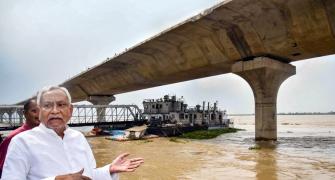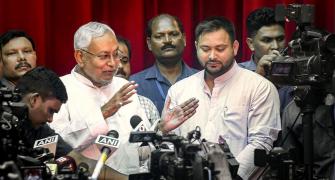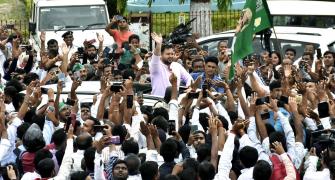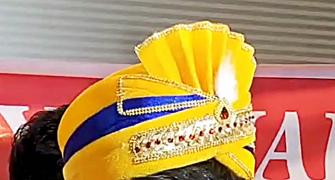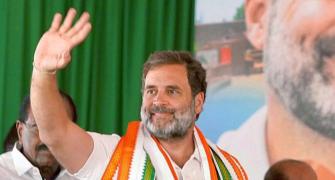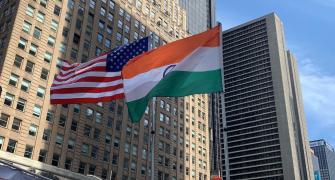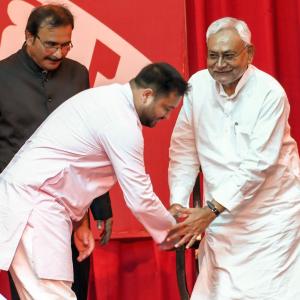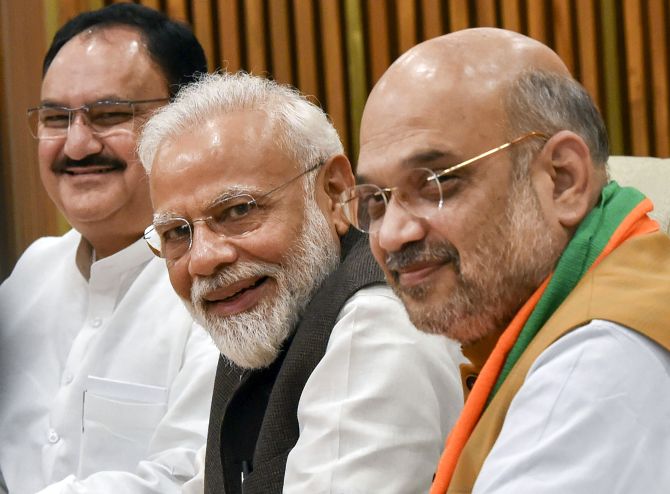'Sonia Gandhiji acted as a mediator in the reunion of the mahagathbandhan and JD-U. She intervened in the state's political situation.'
Shikha Shalini reports.

On Sunday, August 7, Bihar Chief Minister Nitish Kumar made a call. It was to Congress chief Sonia Gandhi.
The two leaders had been in touch even earlier -- Nitish Kumar had called Gandhi when she was down with Covid (before her appearance at the Enforcement Directorate) and the ever sensitive political antennae in Bihar went up.
The Bharatiya Janata Party apparently made nothing of their alliance partner calling the leader of the main opposition party in Parliament.
In any case, leaders of the Janata Dal-United, or JD-U, explained it as a call made out of courtesy shown by the chief minister.
But the call put into motion a chain of events that would have a transformative effect on Bihar politics.
Ajit Sharma, the leader of the Congress legislature party in Bihar, called a meeting of party MLAs on August 8 to discuss the next steps.
"Our mobiles had to be left outside," said a Congress MLA who attended.
Santosh Mishra, Congress MLA from Kargahar, said while Nitish Kumar had probably decided to pull the plug on his alliance with the BJP weeks ago, it was 'Sonia Gandhiji who acted as a mediator in the reunion of the mahagathbandhan and JD-U. She intervened in the state's political situation. And now the result is before you', he said.
It was soon after that call that Rahul Gandhi and Tejashwi Yadav spoke to each other.
Congress leaders hasten to add that the script was Nitish Kumar's alone.
But backing from the Congress added to his confidence and his conviction that if he delayed, the JD-U would be hollowed out by the BJP.
Besides, Nitish Kumar had to ensure all seven constituents of the Mahagathbandhan were on board before he made his moves.
The BJP's role
A day before Nitish Kumar ended the alliance, a senior BJP leader from Delhi called him and asked why JD-U leader Lallan Singh was making incendiary statements.
Union Home Minister Amit Shah had announced in Patna the BJP-JD(U) alliance would continue till 2025 and the two parties would contest both the assembly and Lok Sabha elections together.
Within 12 hours of that announcement, Lallan Singh contradicted this and said the JD-U was still in the process of deciding whether to go with the BJP.
Was the home minister's public announcement not enough, asked the BJP leader.
"What Lallan Singh is saying is no different from what some BJP leaders like Giriraj Singh say regularly," Nitish Kumar replied calmly, adding that there was no problem (in the alliance).
Giriraj Singh's public demand in June that the Bihar government draft an anti-conversion law and criticism of the Bihar government on this account were shot down equally publicly by JD-U leaders, including Nitish Kumar.
This was just one instance of sniping between the allies. But Nitish Kumar made light of it and the BJP thought nothing more of it, either.
There were other instances that lulled the BJP into believing all was well.
According to Ashok Bhatt, the BJP's media coordinator in Bihar, just a day before breaking off with the BJP, the chief minister attended the 'Janata Darbar', at which both the deputy chief ministers, health minister, and labour minister, all from the BJP, participated.
"There was no hint of the decision he was going to take," Bhatt said.
But a range of issues were simmering in the background.
The list of disagreements with the BJP was long. It included the caste census, population control measures, and the Agnipath recruitment plan.
Added to this was R C P Singh's resignation from the JD-U and the party's conviction that he would break the party, the roadshow that Shah and BJP president J P Nadda had in Patna on July 31, and the BJP's plan to implement the Prawas programme in 200 assembly districts in Bihar.
The JD-U was convinced that the latter was an effort to break it from below.
Winning the waning trust
Nitish Kumar realised in order to have credibility with his new friends, he needed to go the extra mile.
Mehboob Alam, Communist Party of India-Marxist Leninist MLA from Balrampur, said: "The JD-U had always supported us when we expressed our opinion in the Assembly against the ill-treatment of minorities. We also detected a few months ago there was a softening in his thinking towards the mahagathbandhan."
CPI-ML chief Dipankar Bhattacharya said: "It's true that Nitish Kumar helped the BJP gain significant ground in Bihar, and the BJP tried to experiment here on the back of Nitish Kumar. But I think that experiment has ended now, and Bihar will play a natural political role. This will probably mean a lot for the 2024 election."
The CPI-ML and Rashtriya Janata Dal feel the Congress's influence was just one factor that made Nitish Kumar take the step he did.
He has repeatedly denied he made his moves because he had his eye on India's top job.
"He did this because he knows there is no vacancy in our ranks," said a BJP leader.
And -- all opposition leaders agree they are one step closer to greater unity.


